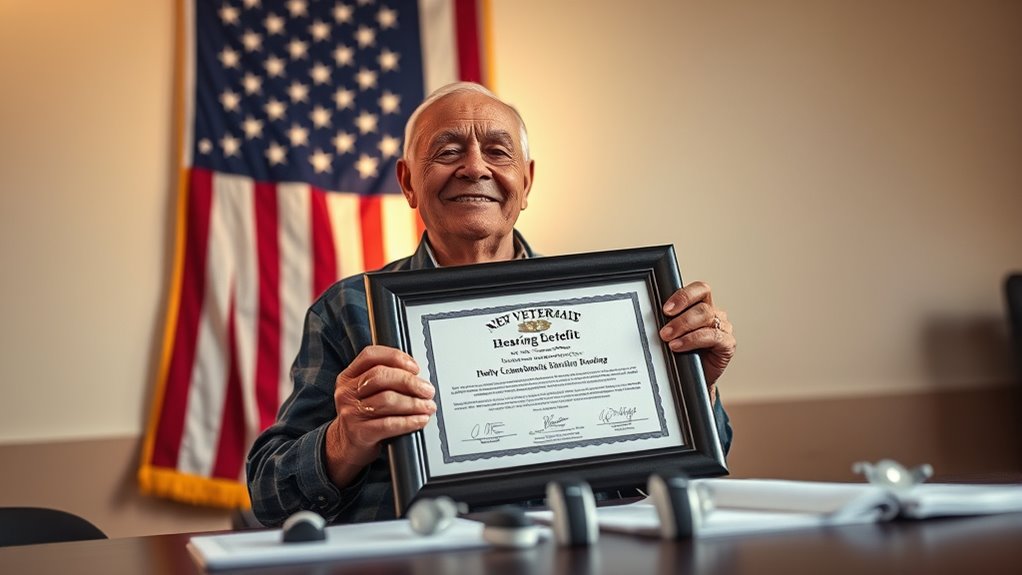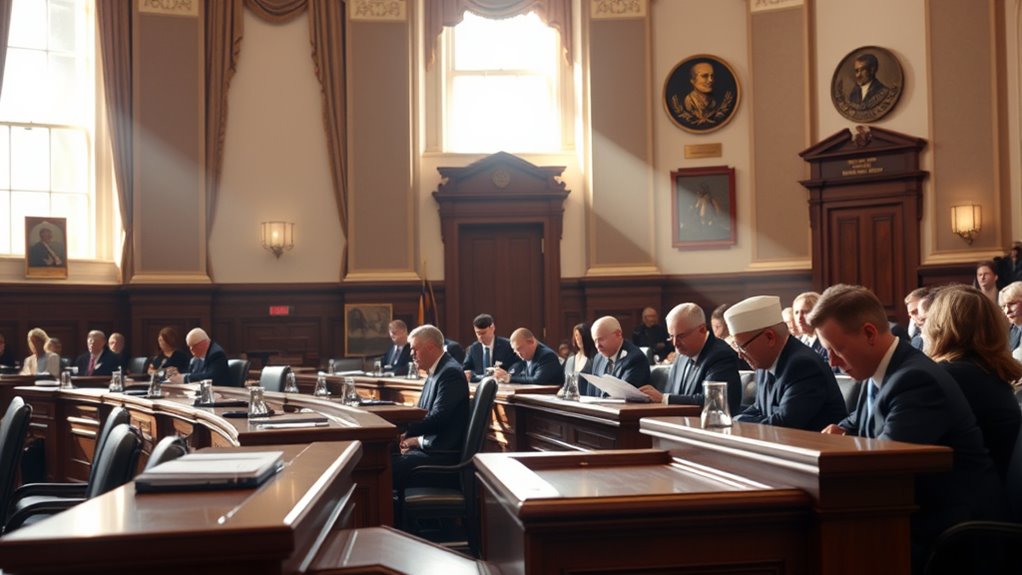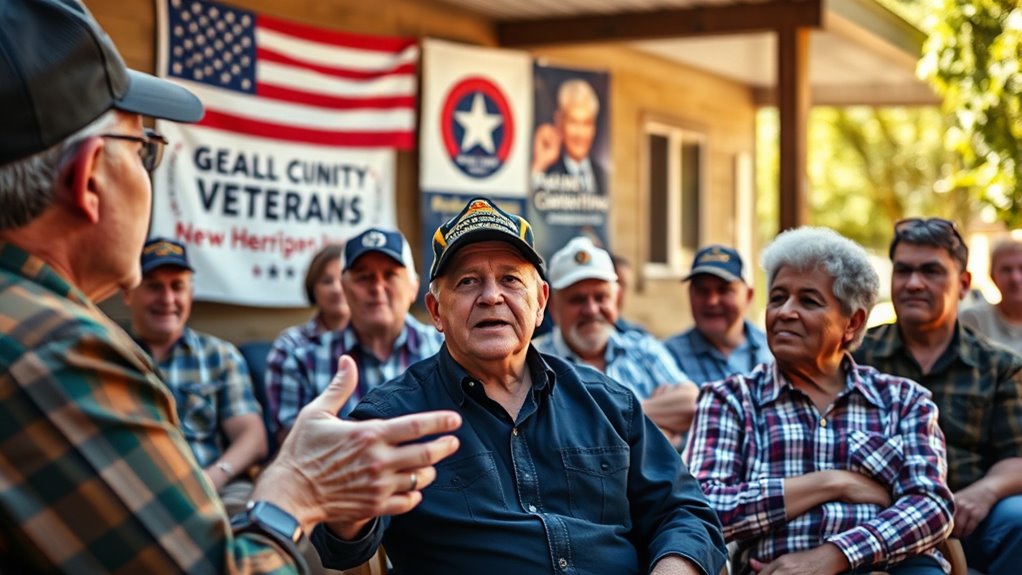A new bill aims to make hearing loss a presumptive service-connected disability, which means your hearing issues would automatically be recognized as related to your military service. This change could help you access VA benefits more easily and quickly, reducing proof requirements and delays. The legislation also encourages better support for veterans’ hearing health. If you want to understand how this bill might impact you and what’s next, keep exploring the details.
Key Takeaways
- The bill aims to establish hearing loss as a presumptive disability connected to military service.
- It simplifies veterans’ claims process by reducing proof requirements and linking hearing loss directly to service.
- The legislation promotes early detection and improved support services for affected veterans.
- Advocacy groups support the bill to enhance benefits and streamline access for veterans with hearing issues.
- Incorporating AI tools, the bill seeks to increase efficiency and accuracy in processing hearing loss claims.
Overview of the Proposed Legislation

The Hearing Loss Disability Bill aims to establish clear standards for recognizing hearing impairment as a disability and to improve support services for affected individuals. This legislation directly impacts service members and veterans, streamlining how hearing loss is assessed and acknowledged. This can lead to more timely and accurate diagnoses, especially when considering the role of early detection in treatment outcomes. Moreover, the bill emphasizes the importance of robust safety measures to ensure accurate evaluations and prevent misclassification. By defining hearing loss as a presumptive service-connected condition, the bill simplifies claims processes and reduces bureaucratic delays. The policy implications are significant, as it sets a foundation for more consistent recognition and support. The service impact is notable: affected individuals could receive faster benefits and tailored assistance. Overall, the bill aims to create a fairer, more transparent system that benefits those with hearing impairments, ensuring they get the support they need without unnecessary hurdles. Additionally, understanding hearing loss symptoms can help in early identification and treatment, further supporting affected individuals. Recognizing symptoms of hearing loss early can significantly improve intervention success and quality of life, especially with advancements in diagnostic methods.
Current Challenges in Hearing Loss Claims for Veterans

Despite the progress in recognizing hearing loss as a service-related condition, veterans face numerous challenges when filing claims. One major hurdle is proving the link between exposure to loud noises during service and current hearing issues. Many veterans struggle to access audiology services promptly, leading to delays in diagnosis and treatment. When applying for benefits, you often need detailed documentation, including hearing tests and records of hearing aid use, which aren’t always complete or available. Additionally, subjective reports of hearing difficulties can be hard to substantiate without consistent audiological evidence. These obstacles make it difficult to secure the benefits you deserve, even when hearing loss clearly impacts your daily life. Overcoming these challenges requires thorough documentation and advocacy. Hearing health and Environmental considerations play a significant role in understanding and managing hearing health in veterans. Ensuring comprehensive medical records can help substantiate claims and improve outcomes. Moreover, understanding the causes of hearing loss related to service exposures can strengthen claim cases and facilitate quicker approvals. Developing a better understanding of exposure history can be crucial in establishing service connection and overcoming evidentiary challenges.
The Significance of Presumptive Service Connection

Presumptive service connection makes it easier for you to get benefits without extensive proof. It streamlines the claim process, saving you time and frustration. Ultimately, it guarantees that deserving veterans like you receive the support you’ve earned. Recognizing the public health impact of health issues like hearing loss underscores the importance of such policies.
Simplifies Claim Process
How does simplifying the claim process benefit veterans with hearing loss? It makes it easier for you to access benefits without navigating complex paperwork or proving service connection through extensive evidence. With presumptive status, your hearing loss is automatically linked to your service, reducing delays and frustration. This streamlined process means you spend less time on paperwork and more time focusing on your ear health and managing hearing aids effectively. Simplification also minimizes the risk of claim denial due to technicalities, ensuring you get the support you deserve sooner. Overall, making the claim process easier empowers you to seek benefits confidently, knowing your hearing loss linked to service is recognized without unnecessary hurdles.
Ensures Veterans’ Benefits
When a veterans’ hearing loss is recognized as service-connected through presumptive status, it guarantees that you receive your benefits without the need for extensive proof or veterans’ hearings. Medical research and technological advancements now make it easier to establish connections between service and hearing loss, supporting this presumption. This shift guarantees you aren’t burdened with lengthy claims or complex evidence, providing quicker access to compensation and healthcare. Presumptive status simplifies the process, acknowledging the common occupational hazards faced by veterans. It also reflects ongoing progress in medical science, which better understands how service-related exposures lead to hearing issues. Additionally, understanding the 16PF traits associated with veterans can help tailor support and benefits to individual needs. Recognizing the science behind sound healing and its role in recovery can further enhance Veteran support programs. Furthermore, preventative measures such as hearing protection during service can reduce the incidence of future hearing loss, and advances in hearing protection technology are making these measures more effective and accessible. This recognition not only validates the sacrifices made by service members but also promotes ongoing improvements in protective strategies. Ultimately, this guarantees you’re protected and supported, honoring your sacrifices without unnecessary hurdles.
Benefits of the New Bill for Veterans

What benefits does the new hearing loss disability bill bring to veterans? First, it simplifies the process to get service-connected disability benefits for hearing loss and tinnitus, reducing stress and uncertainty. Veterans will no longer need to prove their conditions are directly linked to service, making it easier to access benefits. This means you can more quickly obtain hearing aids and tinnitus treatment without extensive documentation. The bill also ensures that veterans receive the support they need for hearing-related issues, improving quality of life. Additionally, by recognizing hearing loss as a presumptive disability, it encourages earlier intervention, which can prevent further deterioration. Moreover, the integration of AI-powered data analysis tools can help streamline claims processing and identify patterns to improve service delivery. Recognizing hearing loss as a presumptive service-connected disability reinforces the importance of early detection and treatment for veterans’ long-term well-being. Overall, this bill offers veterans faster, more accessible support for their hearing health, easing financial and emotional burdens.
Supporting Organizations and Advocacy Efforts

Veteran advocacy groups are playing a crucial role in supporting the hearing loss disability bill by raising awareness and lobbying for change. Legislative support efforts help guarantee the bill gains the necessary backing to pass into law. Public awareness campaigns are also essential in educating the community and garnering wider support for the cause. Leveraging powerful persuasive words can significantly enhance advocacy efforts and influence public opinion. Additionally, understanding the importance of personal debt forgiveness and legislative changes can help advocates tailor their messaging to resonate more effectively with policymakers and the public.
Veteran Advocacy Groups
Have you ever wondered who fights to make certain that veterans with hearing loss receive the support they deserve? Veteran advocacy groups play a pivotal role in championing hearing health and veteran support. These organizations rally resources, raise awareness, and push for policy changes that benefit those affected. They work tirelessly to guarantee veterans’ voices are heard and their needs addressed. Effective advocacy strategies are essential to influence policy and ensure meaningful change. Building awareness about the importance of hearing health can significantly impact policy decisions and resource allocation. Engaging in advocacy efforts helps to elevate veteran issues and secure necessary resources for hearing loss support. Recognizing the impact of family dynamics on veterans’ well-being can further strengthen support initiatives and policies that address comprehensive veteran health needs. Imagine a table where each group acts as a pillar of support: affiliate marketing disclosures help fund many of these efforts and raise awareness about veteran issues.
Legislative Support Efforts
Legislative support for veterans with hearing loss relies heavily on dedicated organizations and advocacy groups that actively push for policy changes. These groups champion veterans’ rights by lobbying lawmakers, providing expert testimony, and mobilizing public opinion. Their legislative advocacy efforts aim to ensure that hearing loss is recognized as a service-connected disability, which can markedly impact benefits and treatment access. By working closely with veterans and their families, these organizations influence legislation to reflect veterans’ needs. They also monitor proposed bills, advocate for amendments, and hold policymakers accountable. Your involvement and support of these advocacy efforts strengthen the push for legislative change. Additionally, understanding the significance of tableware materials and their cultural implications can foster greater appreciation for diverse traditions, which may be useful when engaging with a broad range of stakeholders and communities involved in advocacy. Recognizing the impact of health maintenance on long-term well-being highlights the importance of comprehensive support for veterans beyond legislative measures. Building awareness about service-related health issues can further empower veterans to seek appropriate care and support.
Public Awareness Campaigns
How do public awareness campaigns amplify the voices of those affected by hearing loss? They raise awareness, educate the public, and promote hearing health initiatives, especially through veteran outreach. These campaigns empower individuals to share their stories and advocate for policy changes. Supporting organizations play a key role in this effort by highlighting the challenges faced by veterans and civilians alike.
Key aspects include:
- Increasing visibility of hearing health issues
- Connecting veterans with resources
- Reducing stigma around hearing loss
- Inspiring community and legislative action
Potential Impact on the VA Claims Process

The Hearing Loss Disability Bill could notably streamline the VA claims process by establishing clearer criteria for service-connected hearing impairments. This change means you’ll likely face fewer delays, as medical testing becomes more standardized, and disability ratings are easier to determine. The bill aims to reduce ambiguity, ensuring your claim moves faster through review stages. It also simplifies documentation requirements, making it easier to prove your hearing loss is linked to service.
| Step | What It Means for You | Expected Outcome |
|---|---|---|
| Medical Testing | Standardized tests for hearing loss | Faster, more accurate diagnoses |
| Disability Ratings | Clearer criteria for ratings | Consistent evaluations |
| Claims Process | Streamlined review | Quicker approvals |
Historical Context of Presumptive Disabilities

Presumptive disabilities have played a crucial role in shaping veterans’ benefits by automatically linking certain conditions to military service without requiring detailed proof. Historically, these precedents established a fair method for disability recognition, especially when direct evidence was hard to obtain. Over time, lawmakers recognized that many service-related health issues, like certain respiratory or infectious diseases, warranted automatic status. This approach streamlines claims and ensures veterans receive deserved benefits. Key points include:
Presumptive disabilities streamline veterans’ claims by automatically linking conditions to service, ensuring fair and timely benefits.
- Historical precedents set the foundation for modern presumptive policies.
- They help address gaps in evidence for aging or hard-to-prove conditions.
- They promote timely disability recognition, reducing claim disputes.
- They reflect a commitment to fair treatment based on service connection.
Understanding this history underscores why expanding presumptive coverage for hearing loss is significant.
Next Steps and Legislative Timeline

Building on the historical context of presumptive disabilities, the next step involves outlining the legislative process and timeline for advancing hearing loss disability bills. The legislative timeline typically includes committee reviews, debates, and votes in both chambers of Congress. Your role is to stay informed about these stages and advocate for timely action. The next steps involve sponsoring the bill, gaining bipartisan support, and steering committee hearings. Once the bill passes both houses, it moves to the president for approval. Effectively understanding this timeline helps you anticipate key moments and engage at strategic points. Staying involved ensures your voice influences the process, and awareness of the legislative timeline keeps you prepared to support the bill’s swift progress toward becoming law.
How Veterans Can Get Involved

Wondering how you can make a difference in advancing hearing loss disability legislation? Your involvement can truly impact change. Here are four ways to get started:
- Share your Veteran testimony to highlight real-life challenges and support the bill’s importance.
- Join advocacy groups focused on hearing loss and disability rights to amplify your voice.
- Use social media to spread awareness and encourage others to support the legislation.
- Contact your representatives to express your support, emphasizing the need for hearing loss recognition as a service-connected disability.
Frequently Asked Questions
How Will This Bill Affect Veterans With Pre-Existing Hearing Conditions?
If you have pre-existing conditions, this bill could simplify your disability claims process. It might make it easier to get service connection for hearing loss, even if your condition existed before service. You won’t need to prove the condition worsened due to service, which can speed up approval. This change aims to support veterans with pre-existing conditions by making it more straightforward to receive benefits for hearing loss.
Will the Bill Cover All Types of Hearing Loss or Only Specific Cases?
While it’s tempting to see this as a straightforward fix, the bill’s scope may not encompass every type of hearing condition. It primarily targets service-related hearing loss, but some cases, like tinnitus or hearing aid needs, might still require separate claims. If your experience involves these issues, you’ll want to stay informed about coverage details, as the bill’s focus aims to support those with direct service connections.
What Are the Potential Costs Associated With Implementing This Legislation?
You should consider the cost analysis and budget impact of implementing this legislation. The potential costs could include increased claims processing, veteran benefits, and healthcare services. These expenses might strain the existing budget, requiring additional funding or reallocations. Understanding the financial implications helps you anticipate how the law could affect federal or state budgets, ensuring you’re prepared to manage the increased demand for services and support associated with presumptive hearing loss coverage.
How Does This Proposed Law Compare to Other Presumptive Disability Laws?
You’ll find that the comparative scope of this proposed law is broader than some existing presumptive disability laws, as it specifically targets hearing loss, a common veteran issue. Unlike laws limited to certain service periods or conditions, this bill aims to streamline benefits for a wider group. It’s designed to simplify claims and guarantee veterans receive timely support, making its scope more thorough than many current presumptive laws.
What Challenges Might Arise During the Bill’S Implementation Process?
Think of implementing this bill as steering a winding river. You might face bureaucratic hurdles that slow progress and funding limitations that restrict resources needed for smooth sailing. These challenges could cause delays, confusion, or uneven application of the law. Staying adaptable and advocating for adequate funding can help you overcome these obstacles, ensuring that veterans receive the support they deserve without getting caught in administrative rapids.
Conclusion
This new bill is a essential step forward, like opening a door to clearer support for veterans with hearing loss. It simplifies the claims process and guarantees you don’t have to prove service connection repeatedly. By standing together and advocating, you can help turn this legislation into reality. Your voice matters, and this change could be as impactful as a steady, guiding lighthouse in your journey toward recognition and care.










